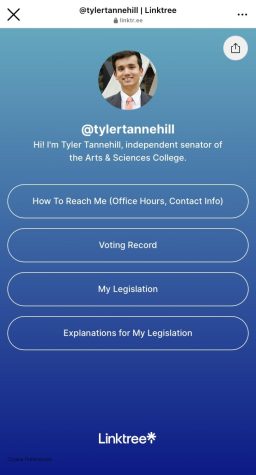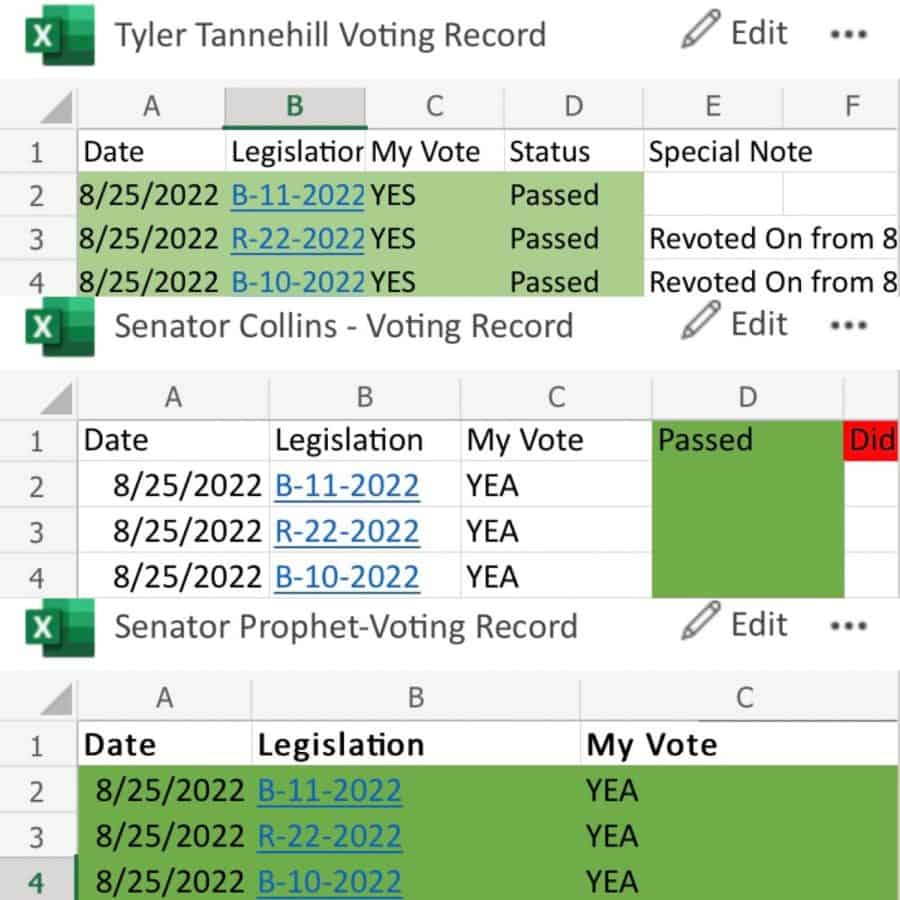SGA Senators begin publishing individual vote records
September 7, 2022
Three University of Alabama Student Government Association senators announced that they will be independently publishing their voting record for the 2022-2023 year.
Last week, College of Human and Environmental Sciences Sen. Karina Collins, the School of Social Work’s Sen. Elizabeth Prophet, and College of Arts and Sciences Sen. Tyler Tannehill announced on social media that they will be recording and publishing their senate voting record.
The senators each made public announcements of the decision on platforms such as LinkedIn and Instagram. All three senators have a link within their Instagram biographies to a spreadsheet that notes their voting record for each item presented in the senate sessions that have been held so far. Sen. Tannehill and Sen. Collins additionally have Linktree links within their Instagram bios that includes other important information, such as their office hours.
The SGA does not currently publicly share records of individual senators’ votes, nor does it require senators to do so. Roll call vote records are available upon request to student media organizations.
Tannehill said the decision reflects his desire to serve students justly.

“I think that as members of SGA, we took an oath and every action we do should be about serving students and honoring our oath. Policies of transparency are especially important to me; it is not just a campaign promise. Senators need to keep the best interests of students at heart. You need to serve in the right way,” Tannehill said.
Tannehill said communication between senators and the students they represent is necessary.
“As a senator, whatever you vote on should be accessible for students to see through a few clicks. What you vote on and what legislation is being created should be open to the public, so students do not feel like they are excluded from SGA,” Tannehill said.
Collins said the decision is a step in the right direction for SGA’s goal of promoting more transparency between the organization and the student body.
“SGA’s goal is to increase transparency … we need to continue to make the stride to be accessible to the enter student body … it is extremely important that our student body has the ability to see how we vote, they voted for us for their own reasons, and they need to have access to us to know they are not isolated from them,” Collins said.
Prophet said the decision to share her voting record was an extension of the platform she ran on, which placed transparency as a top priority.
“Back when I decided to run for SGA senate, I made one of my top three platforms about transparency. I chose to do this for personal reasons and because every elected official should be accessible to voters. Students over the years have called for more accessibility and transparency in SGA so I wanted students to know what is going on in SGA,” Prophet said.
Prophet said students have continually pushed for more visibility within SGA in recent years.
“Over the past few years as a student, I have seen a lot of confusion, at times frustration, from students with what goes on in SGA … Students want SGA to be better and bigger than what it is, but it will take building stronger relationships and trust,” Prophet said.
Their decision to track votes is not commonplace amongst SGA representatives. Out of the 49 student representatives, only three have confirmed their decision to make their voting record available to the public. Tannehill, Collins and Prophet all said they would like to see more SGA senators commit to doing the same.
Last year, former graduate school senator Justin McCleskey proposed a bill to amend the Senate rules to require roll call votes for every legislation proposed and voted on during Senate sessions. The proposed bill would have required a roll call for every Senate vote to ideally increase transparency, and would distribute results to media outlets like The Crimson White and WVUA 23 upon request.
The SGA Senate traditionally uses an audible vote, where senators vote with a “yea” or “nay.” Senators can petition for alternate forms of voting when relevant. Roll call votes would require each senator to vote one at a time as their name is called, so all senators’ votes are recorded.
The bill did not pass and received pushback from several senators. Current Vice President for Academic Affairs Cameron Doyle, then a College of Engineering senator, called the bill unnecessary.
“I just really think this is unnecessary when we already do have the parliamentary procedure in place to request a roll call vote when it is necessary,” Doyle said in a meeting last year. “I think the majority of the time it is not necessary. We all see how often we vote unanimously on legislation, so there’s no reason to waste all of our time.”
Tannehill will propose a new bill designed to electronically record senators’ votes at the Sept. 8 Senate session, which will be held at 6:30 p.m. at the UA Student Center in the Ferguson Theater instead of the Forum.





















